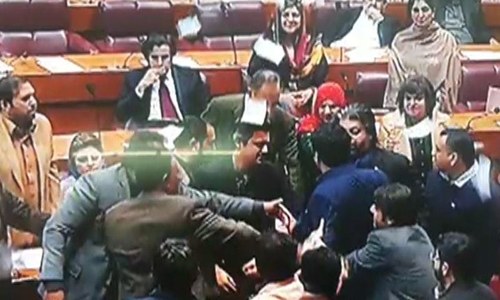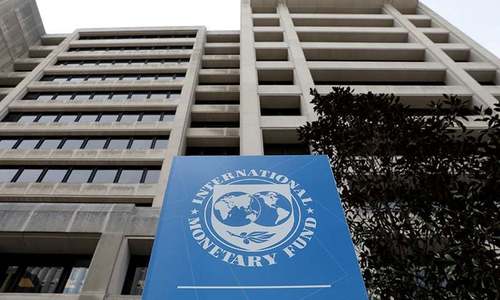ISLAMABAD: The government on Thursday hinted at further tightening of civil expenditures to compensate for slippages on targets committed with the International Monetary Fund (IMF) on revenue collections.
This came from the Ministry of Finance at a meeting of the National Assembly’s Standing Committee on Finance and Revenue as the talks between an IMF visiting mission and the government authorities could not be concluded as per original schedule.
The government’s top economic managers are believed to have engaged the fund management through video-conferencing for a smooth way forward as Islamabad changed its goalpost on energy sector and struggled to deliver on revenue side — the two key structural reforms under the 39-month $6bn Extended Fund Facility signed in July 2019.
The sources said energy sector, tax revenues and Chinese loans remained sticking points until Thursday evening.
Spending cuts only way to avoid mini-budget, officials tell lawmakers
“Then we will have to go for further expenditure management”, said an additional secretary of the Ministry of finance while responding to questions from members of the national assembly as to how the government would meet IMF targets without a mini-budget.
The said there were some pockets in the civil expenditure where space could be created for example like in pension fund. “We will make sure there is bare minimum cut in the development expenditure” that was a priority with the government and the IMF.
Also, the additional secretaries of the finance minister — Dr Arshad Mehmood and Sohail Rajput — told the committee that the government hoped to meet any revenue shortfall by Federal Board of Revenue (FBR) through over performance in non-tax revenue, primarily higher than estimated profits of the State Bank of Pakistan (SBP).
Responding to a question, Dr Arshad said the defence expenditure had already been frozen in the federal budget and no more cuts could be expected there. He anticipated some savings due to lower than budgeted interest payments because of reprofiling of short-term debts into long-term.
He said about Rs34bn savings had so far been secured in the running of the civil government as Rs220bn had been spent on civil expenditure in the first seven months against an annual budget of about Rs440bn. The civil expenditure comprised 55pc on salaries and pensions and 45pc in operational expenditure. He explained that operational expenditures could increase in the remaining months.
Responding to a question, Sohail Rajput said the fiscal deficit limit for the current year was set at 7.2pc in budget and would be limited within 7.5pc of GDP that was not a big problem with the IMF. The main indicator with IMF — primary deficit — was targeted at 0.6pc of GDP that would in fact be about 0.6pc in surplus because of better buffer management — and advance borrowing from the SBP last year.
Provincial transfers
Briefing the committee over National Finance Commission (NFC), Mr Rajput said the provincial transfers were based on FBR’s revenue target of Rs5.555 trillion but actual collection in July-January period of FY20 had amounted to Rs2.369tr. After the inclusion of last year’s arrears of Rs227bn, the total federal divisible pool (FDP) in the seven months worked out at Rs2.596tr.
Of this, 57.7pc share belonged to the provinces and remaining 42.3pc to the centre. Because of lower collections, the actual transfers under FDP stood at Rs1.503tr.
Rajput said the ADP transfers to the provinces were worked out under a constitutional body set up under the NFC. As such, Punjab received about Rs746bn (49.6pc) in seven months against its annual share of Rs1.5tr. Sindh was transferred Rs354bn (46.5pc) of its Rs761bn annual share.
Khyber Pakhtunkhwa was transferred Rs236bn (46.5pc) against its annual share of Rs508bn while Balochistan received Rs164bn (58.3pc) against its annual share of Rs281bn. This was because the 7th NFC promised no cut in Balochistan’s share in case of any revenue shortfalls on part of the FBR.
In addition, the NFC also promised about Rs100.6bn straight transfers to the provinces on account of royalties on crude oil and gas production, gas development surcharge and excise duty on gas on actual production basis minus one per cent collection charges. The total transfers under this head to provinces amounted to Rs64bn in seven months.
Out of this, Sindh received Rs34.3bn against its annual share of Rs53.8bn while Punjab got Rs4.8bn in seven months against annual share of Rs7.4bn. An amount of Rs16.9bn went to the KP against its annual share of Rs25.6bn while Balochistan received Rs8.7bn against Rs13.7bn.
The panel constituted a three-member sub-committee comprising Dr Ramesh Kumar of PTI, Nafisa Shah of PPP and Dr Aisha Ghaus Pasha of PML-N with representatives from trade organisations and FBR to resolve practical challenges arising out of CNIC condition for sales tax and related refund and taxation issues of the businesses, traders and exporters.
The traders from Faisalabad informed the committee about the hurdles they faced due to the conditions for obtaining of CNIC copies from buyer. They were of the view that said condition has badly damaged the business in the country.
Published in Dawn, February 14th, 2020















































